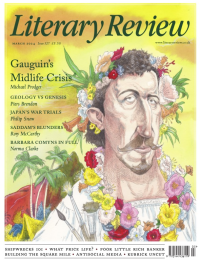Costica Bradatan
From Cult to Church
Heresy: Jesus Christ and the Other Sons of God
By Catherine Nixey
Picador 366pp £25
‘Even when Jesus was small, the villagers realized there was something unusual about him,’ observes Catherine Nixey in the opening of her new book. She considers a couple of possible reasons for this, and then proposes: ‘Or perhaps it was because he killed people.’ That’s how she introduces the apocryphal Infancy Gospel of Thomas, which recounts Jesus’s murderous deeds and plays an important part in her book. Elsewhere in Heresy, a chapter starts: ‘The problem, as St Augustine knew well, was the vagina of the Virgin Mary.’ Hardly a hot topic for today’s theologians, Mary’s vagina, or ‘to be more precise her hymen’, was at one time an ‘issue of profound theological importance to Christianity’.
Heresy is replete with bold stylistic heresies of this kind. Writing to provoke an audience seems to come naturally to Nixey. It’s what she does for a living, after all. An accomplished journalist, she tackles her subject with wit and verve – indeed, with considerable cheek – and an excellent command of mise en scène.
The book’s stated focus is the decades following the Roman Empire’s embrace of Christianity in the fourth century AD, yet there is much zigzagging across time and space. From pagan Greece to 19th-century America, from medieval China and India to mid-20th-century Iraq and Egypt, Heresy covers quite a bit of ground. The sprawling narrative is as enticing as it is disorienting – riskily so at times.
In February 313, an edict was passed in Milan that was to change world history in a way that few legal documents, before or after, ever would. It stated, reasonably enough, that ‘it was proper that the Christians and all others should have liberty to follow that mode of religion

Sign Up to our newsletter
Receive free articles, highlights from the archive, news, details of prizes, and much more.@Lit_Review
Follow Literary Review on Twitter
Twitter Feed
In 1524, hundreds of thousands of peasants across Germany took up arms against their social superiors.
Peter Marshall investigates the causes and consequences of the German Peasants’ War, the largest uprising in Europe before the French Revolution.
Peter Marshall - Down with the Ox Tax!
Peter Marshall: Down with the Ox Tax! - Summer of Fire and Blood: The German Peasants’ War by Lyndal Roper
literaryreview.co.uk
The Soviet double agent Oleg Gordievsky, who died yesterday, reviewed many books on Russia & spying for our pages. As he lived under threat of assassination, books had to be sent to him under ever-changing pseudonyms. Here are a selection of his pieces:
Literary Review - For People Who Devour Books
Book reviews by Oleg Gordievsky
literaryreview.co.uk
The Soviet Union might seem the last place that the art duo Gilbert & George would achieve success. Yet as the communist regime collapsed, that’s precisely what happened.
@StephenSmithWDS wonders how two East End gadflies infiltrated the Eastern Bloc.
Stephen Smith - From Russia with Lucre
Stephen Smith: From Russia with Lucre - Gilbert & George and the Communists by James Birch
literaryreview.co.uk